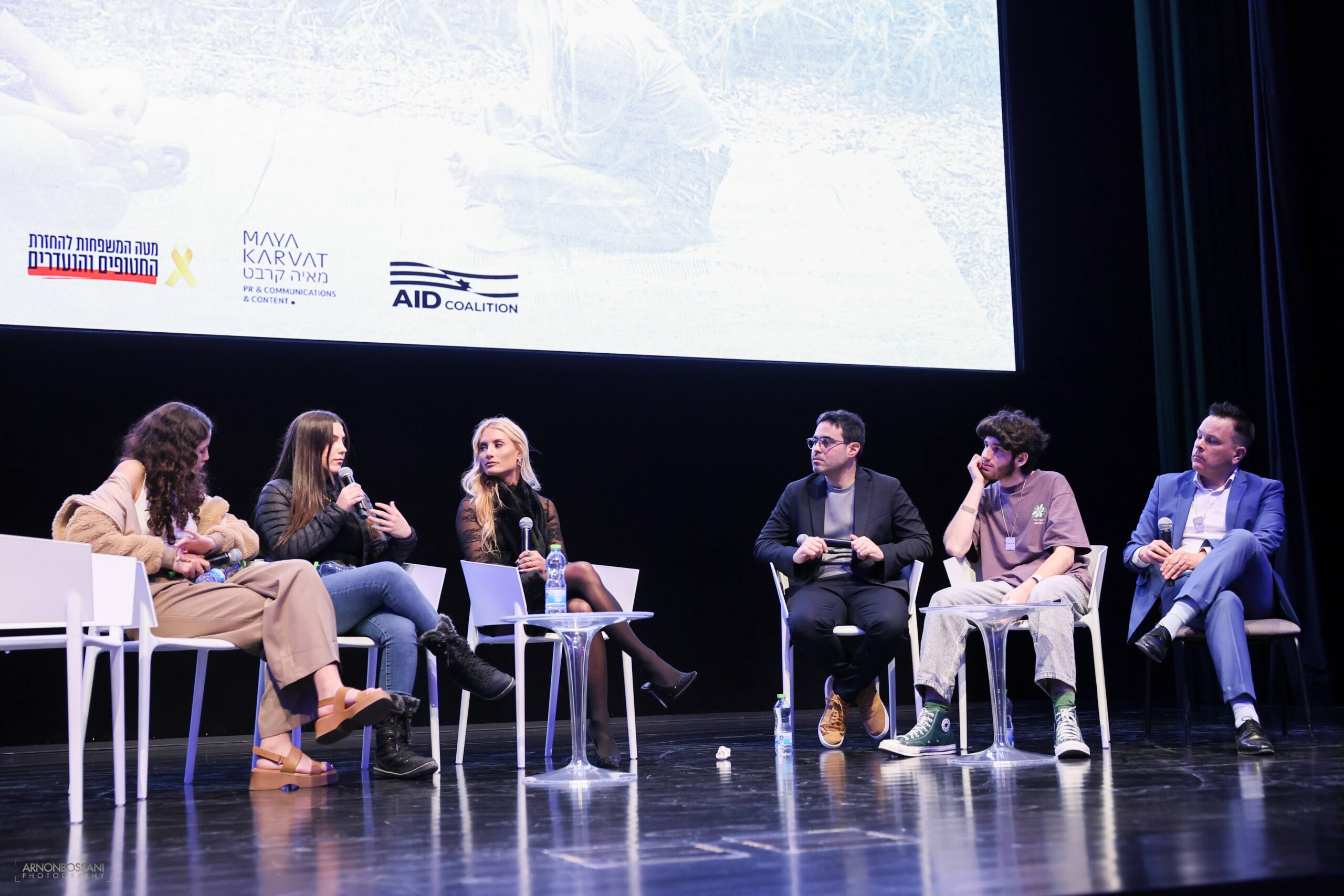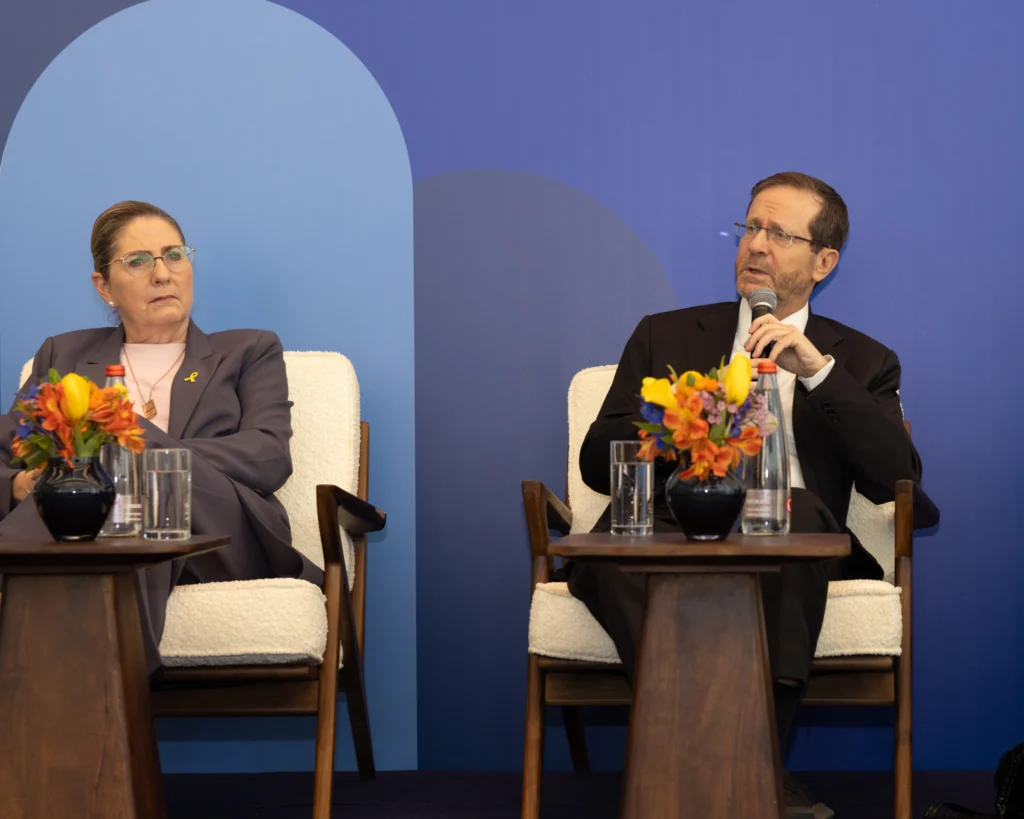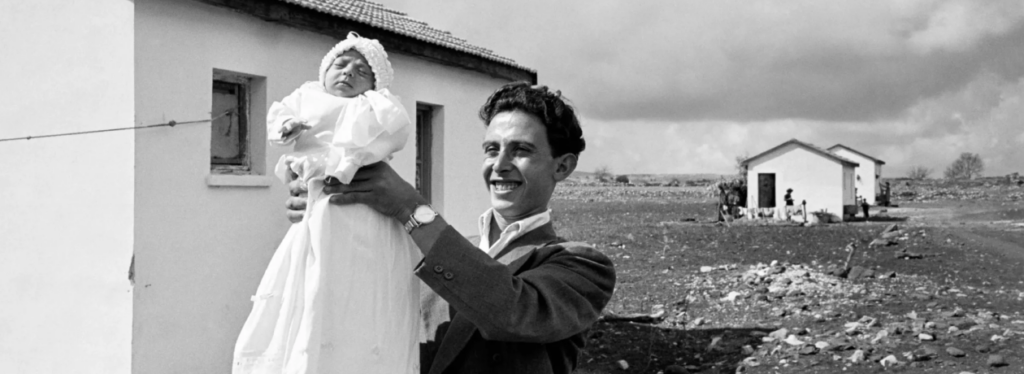
Montana Tucker and President Herzog attended the Museum’s emotional screening of the “Children of October 7,” a documentary that tells the story of that tragic day through the perspective of child survivors.
“It's like everything that feels safe isn't anymore,” 11-year-old Yael Idan said with a faraway look in the documentary.
Idan’s family changed forever when Hamas terrorists took control of their home and broadcasted the carnage live on social media with her mother’s phone. Yael’s sister, Maayan, was shot in the neck and died in front of her eyes. Her father, Tzachi, is still in captivity along with 99 other hostages – some alive and many others confirmed dead.
As of this writing, Idan hasn’t seen her father in 429 days.
Sadly, Idan’s story is not a unique one, as 38 children were murdered that day and many more survived to testify to atrocities no child should have to witness.
The premiere of the documentary was held at the Museum of Tolerance Jerusalem on December 2 and featured remarks from President of the State of Israel Isaac Herzog and the film’s star, pro Israel advocate and social media influencer Montana Tucker. Members of the audience also included rescued hostages, relatives of those killed on October 7 and hundreds of high school students who were visibly moved during the screening, which told harrowing first-hand encounters of destruction, violence and wanton antisemitism.
The film’s producer, Eytan Schwartz, acted as the evening’s emcee and said, “It seems that there is no better place for the premiere of this film. The Museum is not just a museum, it is an institution that reflects the values that we Israelis know so well: responsibility, dialogue, respect.”
Schwartz’s production team included Meny Aviram; Zameret Alexandroni; Mor Tregger; Director of Photography Sasha Gavrikov and Editor Yotam Katzur.
To that end, the Museum was proud to host the screening of the film which dovetails with its mission to advocate for the hostages and underscore the dangers of what happens when hate and vitriol translate into indiscriminate violence.
Sigal Mansuri, who lost her two daughters and future son-in law when they were murdered at the Nova Festival, was also in attendance and she praised the Museum for giving a platform for the victims of that day.
“When I first met the Museum director Jonathan Riss in LA, he introduced himself and invited us to tour the Museum. We were, of course, speechless. Later, they reached out to me to share my testimony and my family's tragic story in the 06:29 From Darkness to Light Exhibition,” she said. “When I first learned about the concept and mission of this exhibition, I knew it was my duty to share my story, to raise my voice, so that the horror our people went through on that tragic
Saturday will never be forgotten.”
The documentary, which was produced by Kastina Communications, shares that same singular purpose. In it, Tucker compassionately interviewed Idan and seven other children from the Gaza envelope who survived the horrific Hamas massacre. The film was made possible thanks to a generous contribution from Jonathan Barsade and the AID Coalition and with assistance of the
National Public Diplomacy Directorate at the Prime Minister's Office.
As for Tucker, who has 14 million followers on social media, she was personally motivated to be a part of this project for which she refused to accept payment. Since October 7, Tucker has leveraged her massive social media following to relentlessly advocate for Israel and Jewish people around the world, raising awareness for the Israeli hostages who remain in Hamas captivity while fighting the unprecedented global rise in antisemitism and anti-Israel sentiment which has swept the world since the outbreak of the war.
“This past year has completely changed my life. When I started doing this, it was just something that I knew I had to do. Something inside of me that told me I had to do this and there was no other option,” she told the jam-packed 400-person audience at the Museum. “My grandparents are Holocaust survivors and I grew up hearing their stories my whole life. My grandmother, Lily, who is still alive today at age 96, was 13 years old when she was taken to Auschwitz and saw her mother get beaten up and dragged to the gas chambers.”
Tucker's remarks were made after the screening where she was joined on stage by the film's director Asaf Becker; Schwartz; mental health specialist Dr. Yoray Barak; and 16-year-old Ella Shani from Kibbutz Be’eri, who appeared in the film. Together, they discussed their experience of reliving that bloody Saturday through the film and how the production process became therapeutic and aided the children’s healing process.
At the premiere of the film, Herzog spoke of the film’s importance in bearing witness to October 7 and bringing new meaning to the words, “Never Again.”
“Even after more than a year, it seems that one of the most difficult facts to understand is that for hours and days children were in distress. It is difficult to comprehend the fact that souls that are so pure, so sweet, so precious, were exposed to the worst of humanity,” he lamented.
Throughout the film, Tucker acts not only as an interviewer, but as a compassionate listening ear to the children who spent the past year trying somehow to make sense of their lives which turned upside down in an instant.
For example, she follows 14-year-old Ella Shani of Kibbutz Be’eri to the attic where her father was hiding before he was gunned down. The two are seen slowly climbing up the narrow
ladder to the dark crawl space where traces of her father’s blood are still splattered on the floor. Shani reveals to Tucker that she had a strained relationship with her father who didn’t
live with her. “I know I never said this enough, but I love you,” a shaken and distraught Shani said, reading a text message she sent her father after he died. Tucker then embraced Shani and
on the car ride back home, she reminded her what all of these children need to hear most of all, “It’s okay to not be okay.”
The other six courageous children interviewed in the film are: Eitan and Yael Yahalomi from Kibbutz Nir Oz, who were 12 and 10 years old at the time of the massacre, Amit Cohen (12) from Kibbutz Nir Oz, Rotem Matthias (16) from Kibbutz Holit, and Alona and Ya'ala Russo
(12 and 10) from Kfar Aza. Although these children suffered unspeakable tragedy, the documentary is also a testament to their resilience and how they very much crave enjoying
whatever is left of their childhood even though their innocence has been forever shattered.
Matthias, whose parents both died because they tried to save him while terrorists shot into their bomb shelter, said, “How do I really feel about this? I can't really explain it, but at the same time I feel alive, I feel brave, I feel good, I feel empty, and I don't know how to really go on with my life. It's something that's gonna stick with me forever. I can only learn how to live with it in a better and more efficient way.”
The film was created for international audiences with the goal of airing on TV networks worldwide so an international audience can hear the children’s harrowing testimonies alongside their extraordinary resilience and unwavering desire and commitment to heal from the tragedy.
Tucker said, “I just hope and pray that it continues to make an even bigger impact and that the entire world hears their stories and changes this narrative about what happened and what continues to happen. I can't thank you enough for being vulnerable enough to share your story with myself and the world.”









